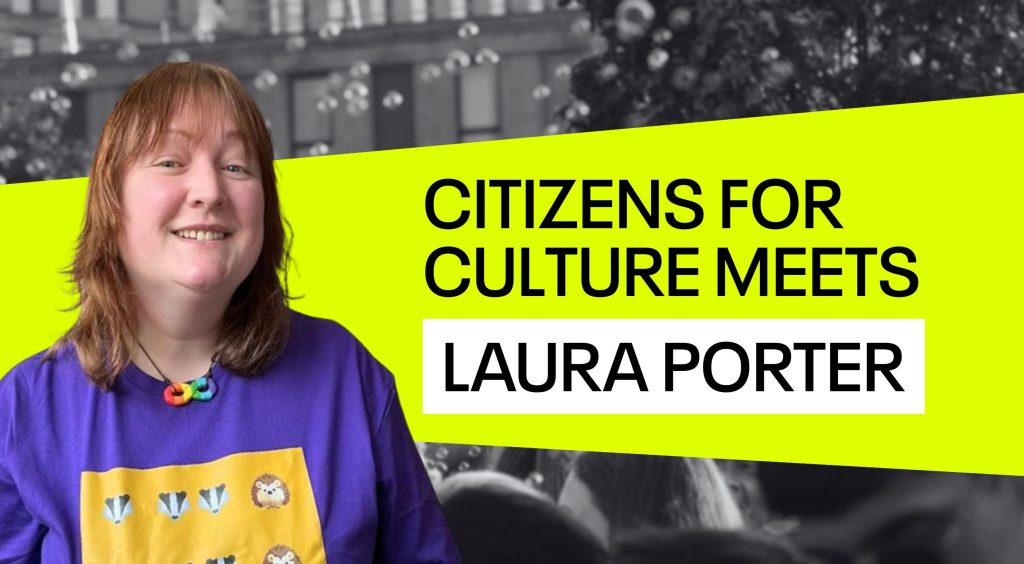
We want to hear from people from every corner of the West of England to better understand individual experiences of culture, what’s working, what’s missing, and what needs to change. These conversations will help inform our Citizens’ Assembly as they explore and answer this vital question: “What would culture and creativity look like in the West of England if they were for everyone?”
In our new ‘Citizens for Culture meets’ blog series, we’re connecting with people from across the region behind the live music and community events that bring the West of England to life. Learning more about how they work, what culture means to them, the communities they work with, and why inclusive cultural spaces matter.
In the first of our new blog series, we welcome Laura Porter, whose work in North Somerset is a powerful reminder that culture thrives when everyone is invited to take part. Take a read below as we ask Laura a few questions.
Can you tell us a bit about yourself and the work that you do?
I’m a clarinet and saxophone specialist with a background in musical theatre, teaching, and ensemble leadership. After becoming physically disabled in 2017, I shifted my focus to inclusive community music-making. With support from Arts Council England and Culture West, I’ve explored new ways to create music with people of all abilities and backgrounds.
I founded Now Hear This Music C.I.C. in North Somerset, where we run diverse music groups and celebrate each season with a joyful, collaborative party that brings everyone together.
What inspired you to get involved in cultural organising, and what keeps you motivated?
After becoming disabled in 2017, I dedicated myself to fostering accessibility and inclusion in music. Through my journey of physical recovery and self-discovery as a neurodivergent individual, I became determined to dismantle barriers that exclude others.
I invested in accessible instruments and assistive technology, creating spaces where everyone can participate and connect. I believe everyone deserves access to music, and I am committed to making that a reality.
How would you describe the current state of culture in the West of England?
Culture, to me, is simply people being In places like Bristol and Bath, that spirit thrives through vibrant, diverse microcommunities. But in North Somerset, the picture is different.
A lack of funding, poor transport links, and inaccessible spaces mean fewer opportunities to connect and celebrate. Despite being named a Priority Place by Arts Council England, access here often feels tokenistic, and there’s still a long way to go in understanding what true inclusion looks like. Amplifying disabled voices and embedding awareness systemically is vital.
What does “culture” mean to you personally, and how do you see it reflected in your community?
Culture is a snapshot of human interaction in an identified place and time.
Are there any local cultural events, spaces, or traditions that you feel truly represent the spirit of your community?
For years, I felt excluded from my community’s cultural life. The compounded microaggressions became too much, and I was avoiding participating. So, when my mental health improved, I created something new, where I truly belong. After becoming disabled, I grew frustrated with events that segregated people by labels like “Relaxed Performance” or “Elderly Persons’ Event.” To me, real community means everyone in the same room, at the same time, together.
In your experience, what are some of the biggest barriers to cultural participation in the West of England?
North Somerset’s poor transport links, inaccessible buildings, and lack of affordable and accessible parking make cultural participation incredibly difficult, especially for disabled people. As a wheelchair user transporting musical instruments, public transport simply isn’t an option. While reducing car use is important, rural communities need realistic alternatives. Right now, they don’t exist.
What would you like decision-makers to understand about the cultural needs of your community?
You need to come and see us. Hear us. In person. Stop the desktop analysis. Stop the “Have Your Say!” surveys… Get yourselves into these spaces to see for yourselves. Come and see me! Participate with a glockenspiel and tambourine in your hands.
Creative Health matters, take a read of my recent post.
Privacy Policy | Cookie Policy | Terms and Conditions | Contact Us | Site infomation